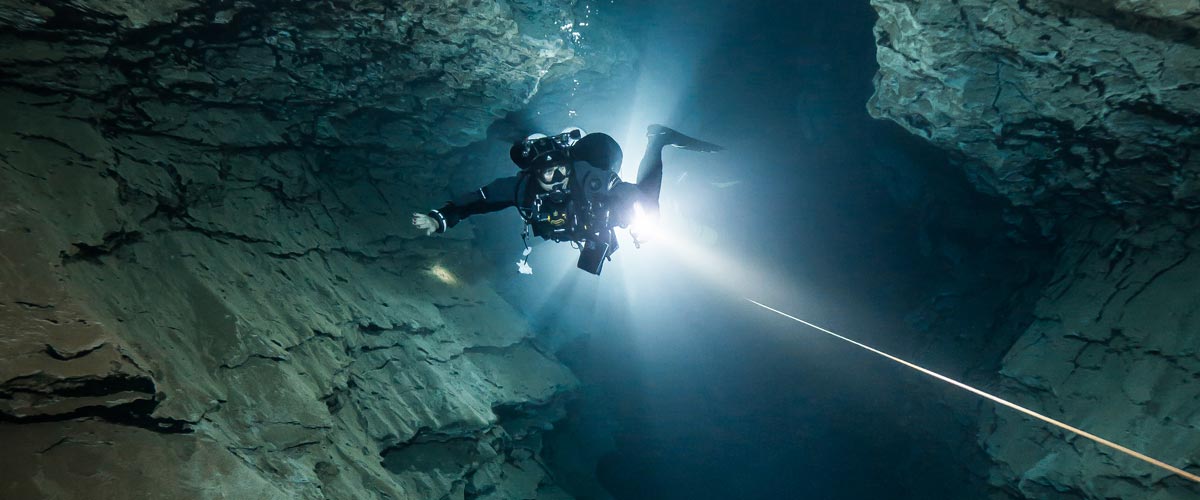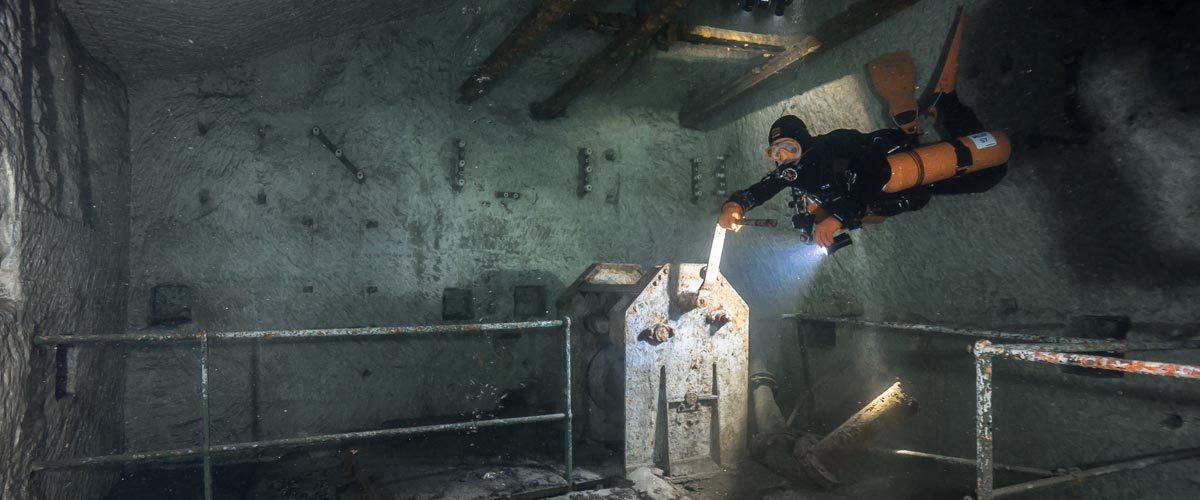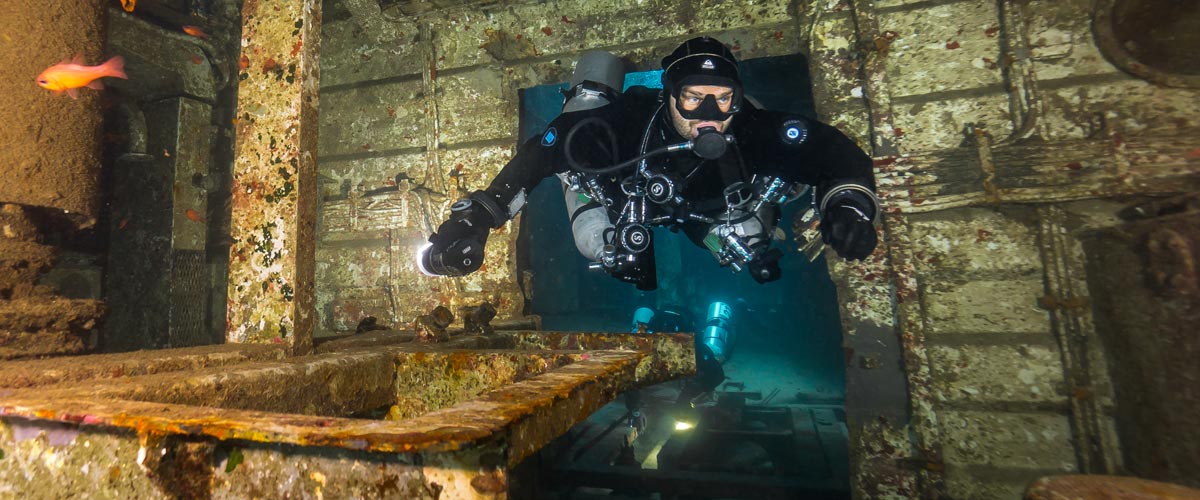Dive Training Blogs
Deptherapy returns to its Roots – Part 7
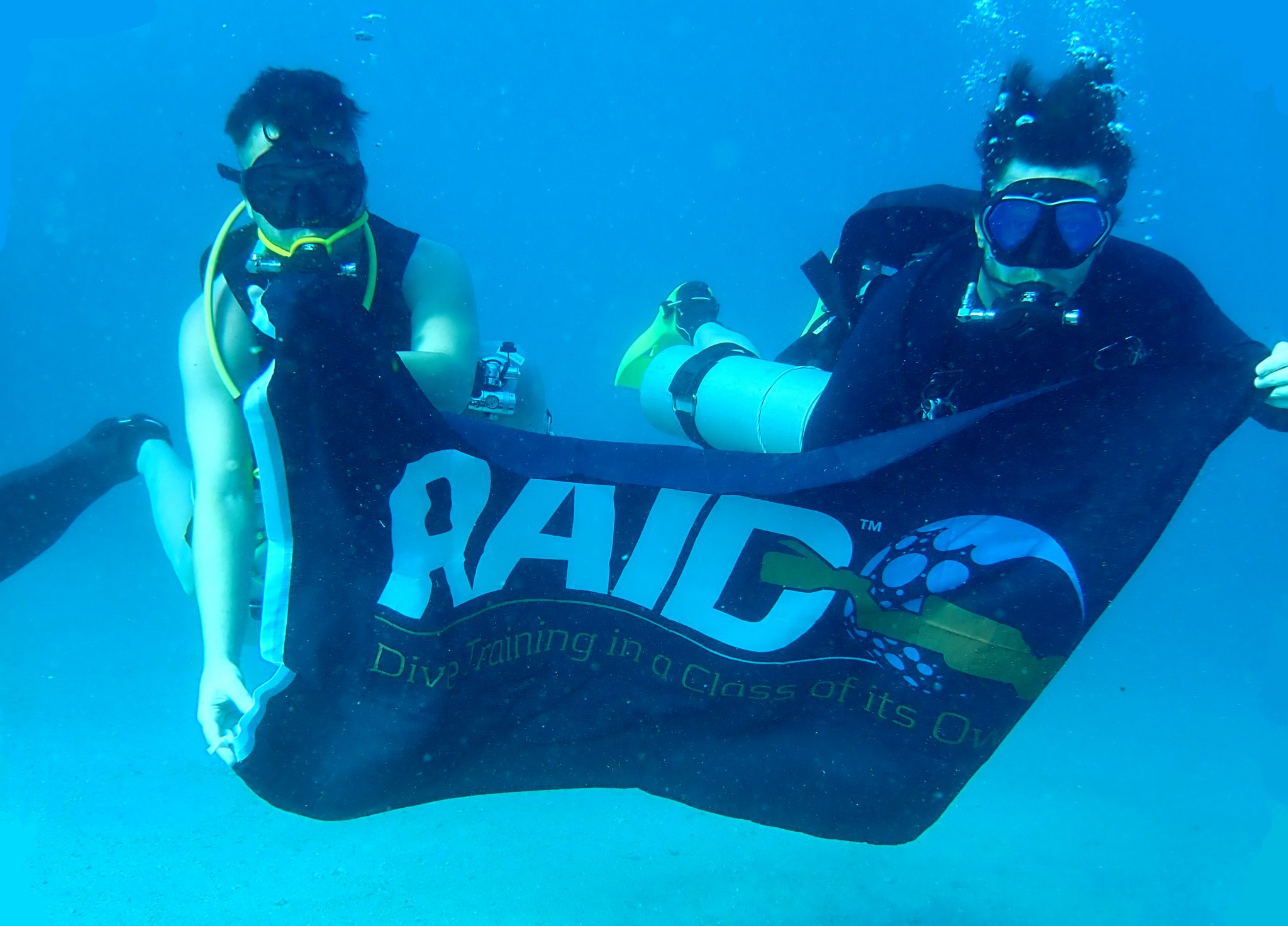
Join Richard Cullen from Deptherapy for the final part of his Blog about the charity’s recent expedition to Roots Red Sea, El Quseir, Egypt.
Deptherapy expeditions do not just magically happen, they need planning and they need funding. This expedition was funded by our long-term partners the Veterans’ Foundation. The funding is part of a grant they awarded us for programmes this year, which were then put on hold because of COVID.
All charities in the Armed Forces’ Sector are struggling for funds. Deptherapy desperately needs support going forward and every penny counts.
We know what we do works and at the end of this blog you will find details of the research studies into Deptherapy’s programmes and how they impact on the lives of our beneficiaries. This includes details that are hot off the press about the latest study that reports that what we offer through scuba diving and 24/7 support has benefits beyond those found in other sporting rehabilitation programmes.
Well tomorrow we fly home, late in the evening with the journey home for some of the guys who live up North taking around 15 hours after leaving Roots.
We want to make the most of today but with the tide running we are not going to be able to dive until later this morning which means only two dives today.
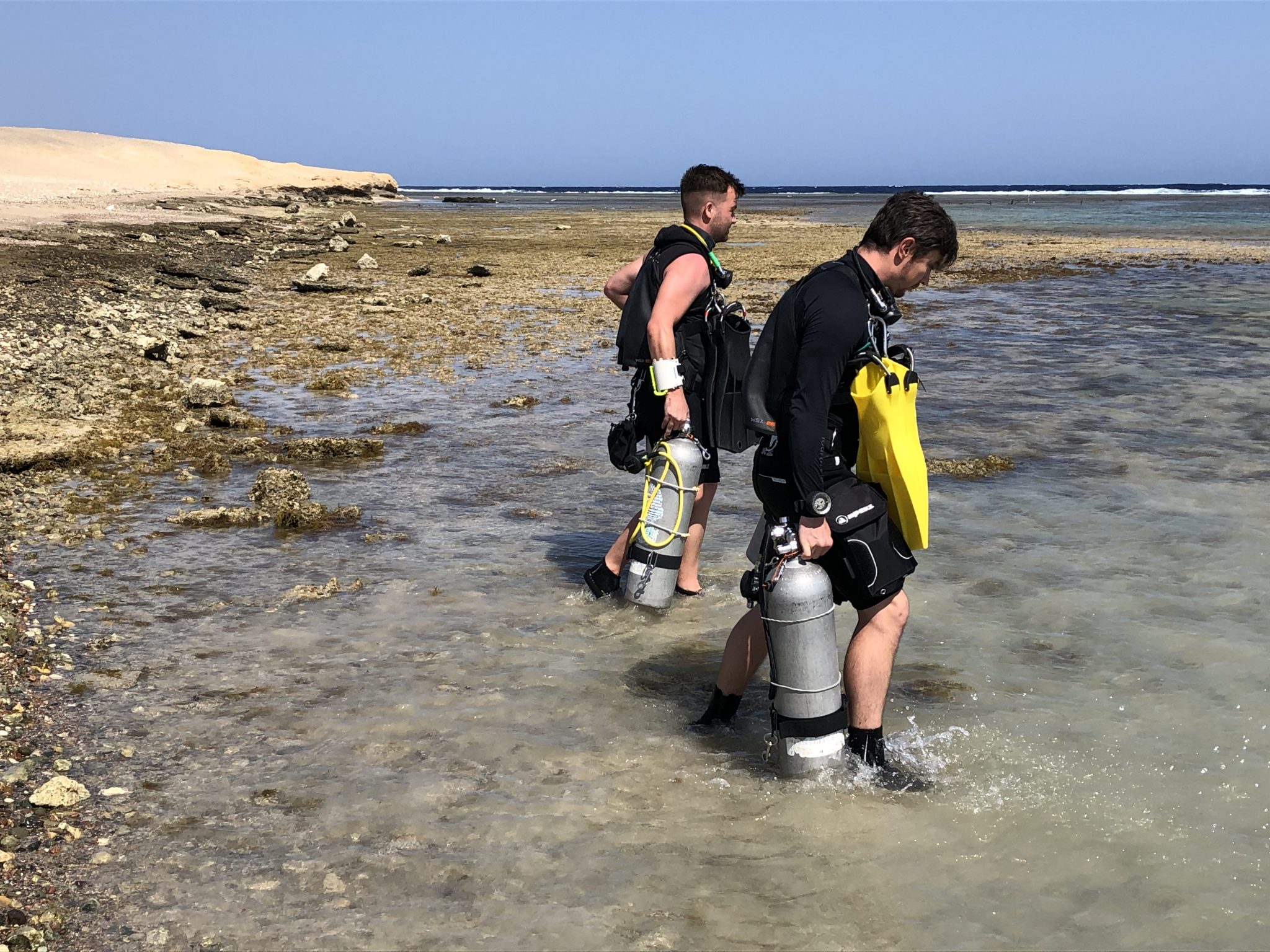
Oatsie and Swars about to start their sidemount dives
Things, however are really busy over at the dive centre with Swars and Oatsie putting their sidemount kit together for their training dives with Steve Rattle leading to their RAID sidemount qualification. It has been nice to be able to offer the guys this extra training, given the amount of work they have put in this week. They have needed to get through their theory quickly but given the RADI online learning system this has not been too arduous.
Steve came diving with us yesterday to get some more photos and was really amazed at the progress that Corey had made. He was quite open in his praise, as in his view Corey has gone from a non-diver to being a very competent OW diver capable of diving, unsupervised, with a buddy. Praise indeed.
Other than the sidemount course we are diving as a group today: Corey, Keiron, Michael, Moudi and me. Corey has been given some tasks – SMB deployment on both dives and the afternoon dive will be a ‘naturalist dive’. Guy Henderson has set Corey a task: ‘to identify three species of fish and record the time into the dive and the depth at which each one was spotted’. Guy runs Marine Biology courses on the reef and knows where the fish are to be found, how long into the dive, and at what time.
The two Toms are getting put through their paces. They have walked their cylinders down to the entry point, but Steve sends them back to the dive centre to collect other kit they should have brought with them.
Our general dive goes well and the sidemount guys appear from their sidemount dive some 90 minutes after dipping their heads under the water.
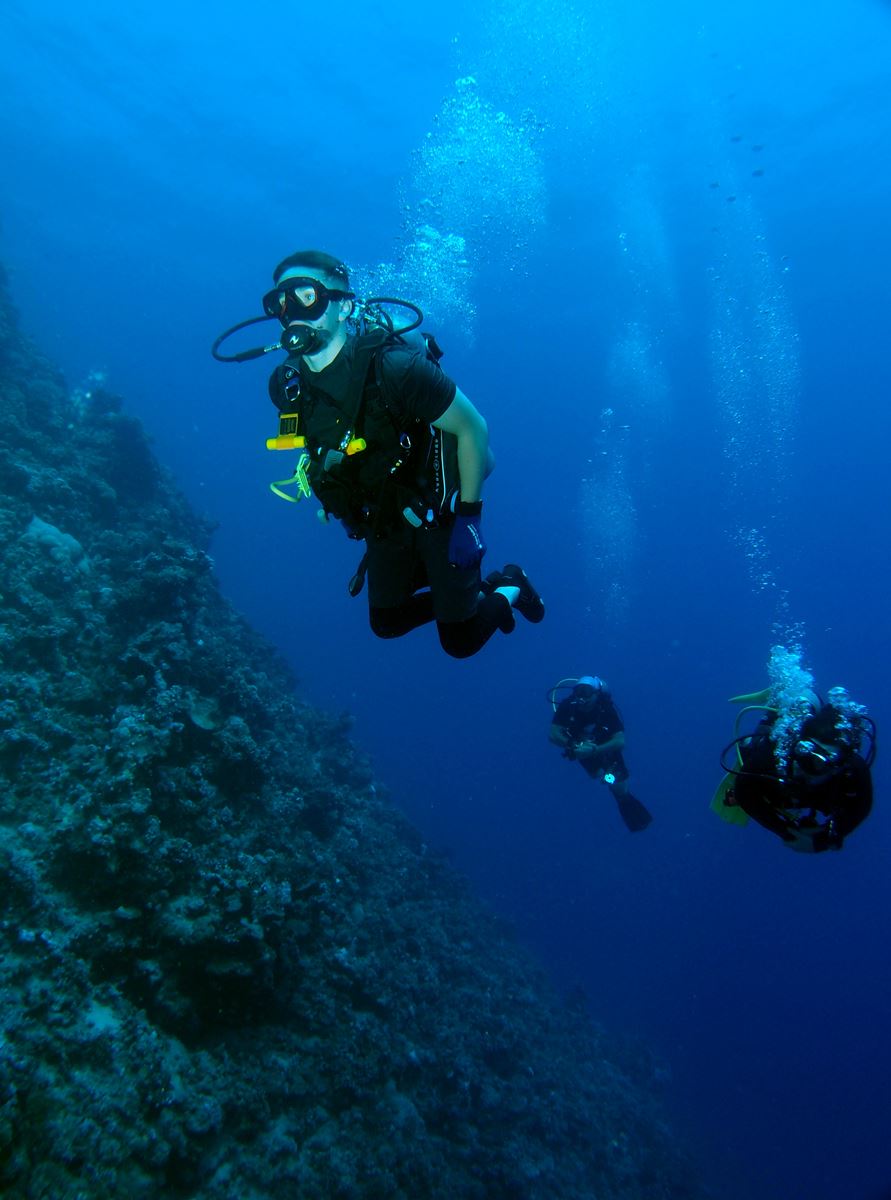
Corey enjoying being a RAID OW20 Diver
Lots of bubbly chat at lunchtime, a group of really happy divers. Corey really has benefited from the week and over lunch thanked the team for making him a diver. He has very quickly become part of the family and after returning home he published an amazing post on Facebook about his experience. Corey really gets Deptherapy and had soon realised that we see past mental and physical injuries and see the person inside and work with that person. He also realised that we want beneficiaries to see their fellow beneficiaries in the same light. He knows he now has another ‘family’ – a family of brothers in arms who have two things in common, they served their country and they have suffered life changing injuries or illnesses.
Back into the water for the afternoon dive and Corey identifies the fish and records the details on a slate. The two Tom’s complete their second dive and qualify as RAID Sidemount Divers. Great!
Kit packed away and it is time to return to the camp for a few well-earned last night drinks.
I am often asked why we use Roots as our exclusive base for diving. I have mentioned before that it offers us an ideal retreat, away from the hustle and bustle of everyday life. We are secluded and there are no distractions such as late-night bars etc.
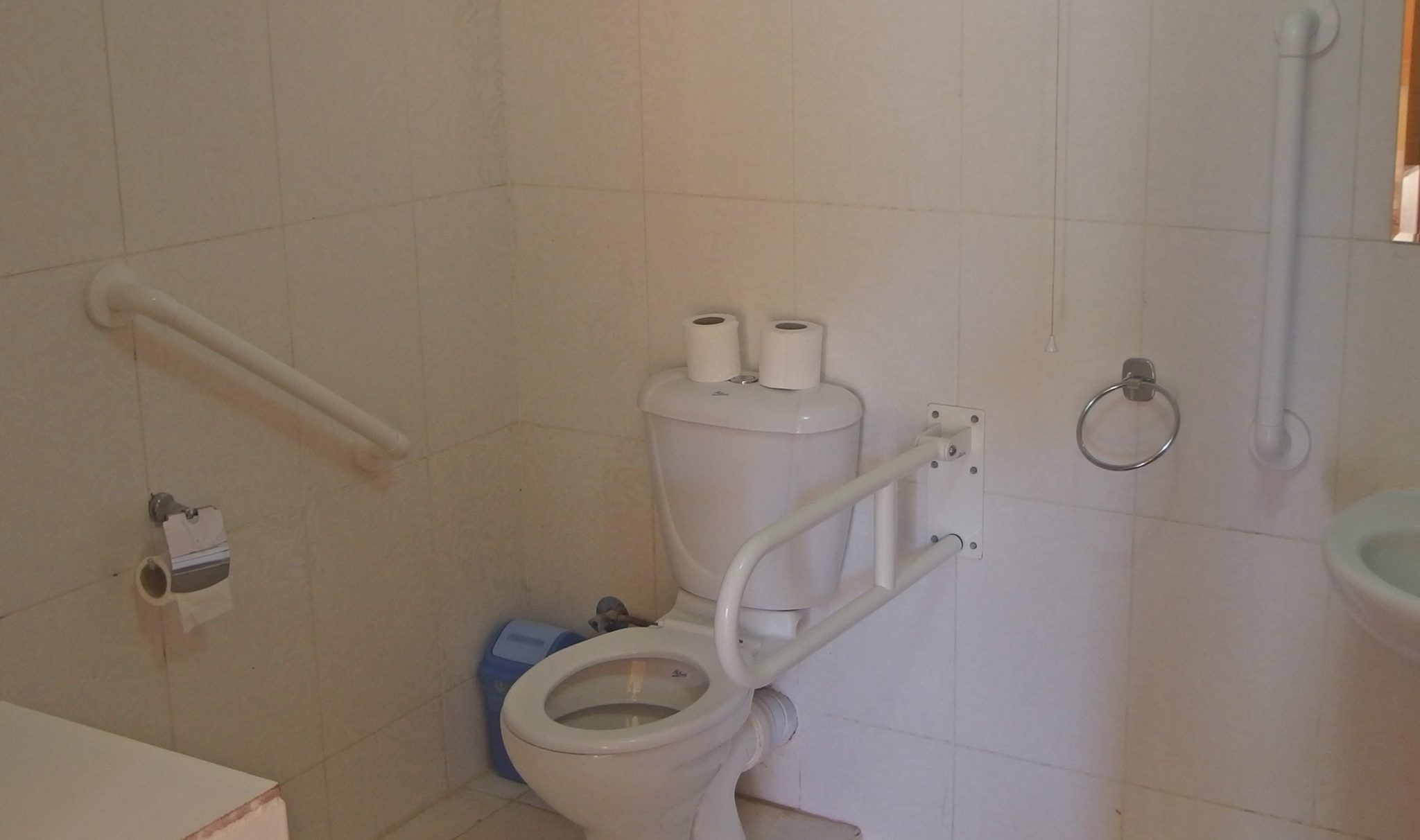
Roots Accessible Room
The second reason is the amazing welcome we receive from Steve, Clare, Moudi and the team. We have been going to Roots since 2014 and many of the staff have become good friends, they understand our needs and are the friendliest people you could ever wish to meet.
The third reason is the huge investment Steve and Clare have made in making the resort and dive centre accessible for those with physical injuries including those who need to use wheelchairs. All our beneficiaries can enjoy Roots and, in fact, love it here. The reef is perfect for us and in non-COVID times we can travel to the Salem Express and other dive sites to enjoy more of the Red Sea experience.
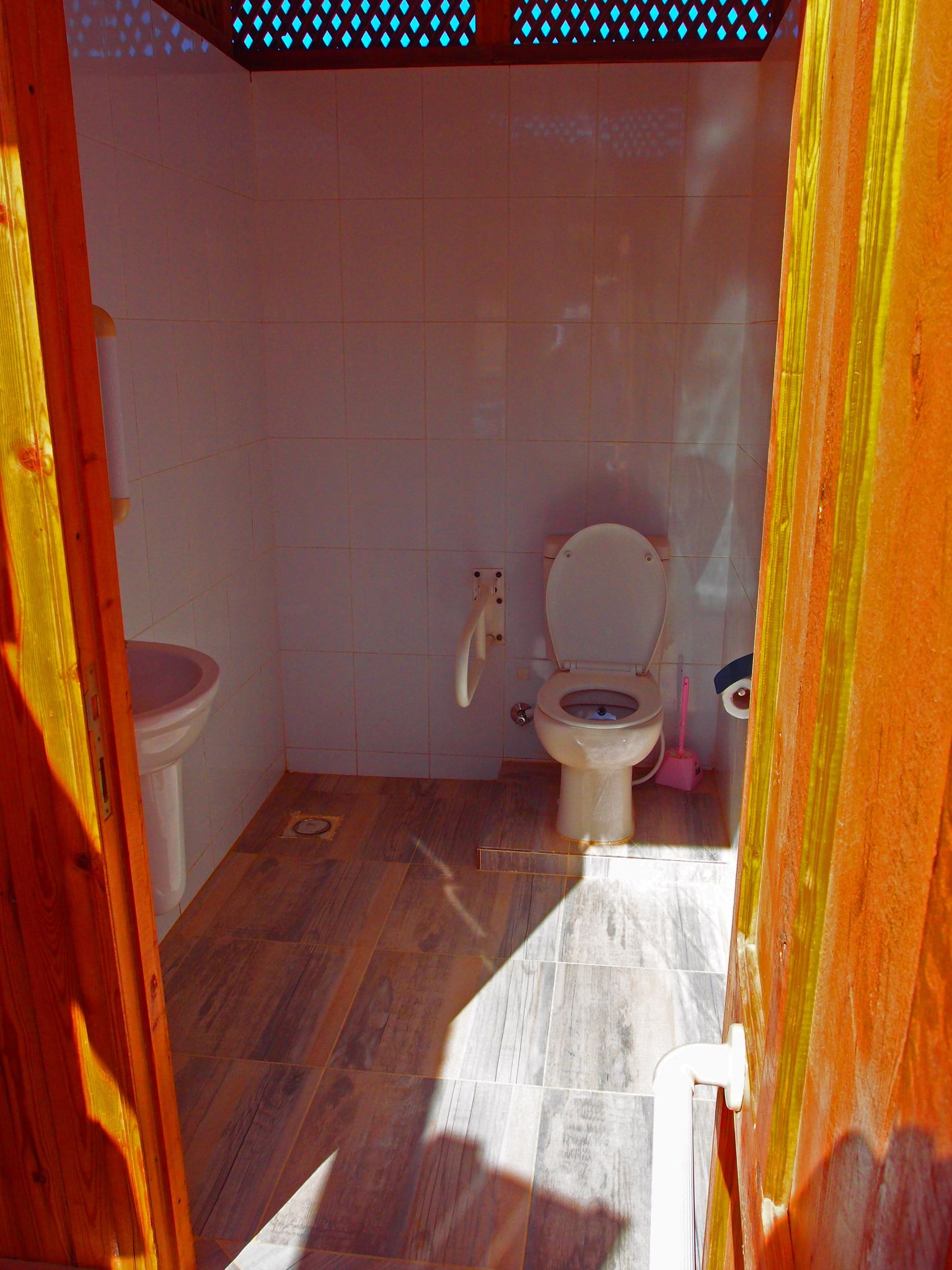
Accessible toilet on the Roots beach
After discussions with the team I was very proud to be able to tell Corey that his progress had been such that we were inviting him on the Armed Forces Covenant Fund Trust sponsored two-week Marine Biology Course at Roots in June 2021. There is lots of homework to undertake under the guidance of Dr Debbie McNeill of Open Oceans and Corey will be sent the Red Sea Guide which is the basis for study.
While on that programme, Corey with fellow beneficiary Dale Mallin, will complete his RAID Advanced 35 course. This all builds to a 10-day Red Sea liveaboard in 2022, onboard Roots’ new boat Big Blue where 18 beneficiaries will compare the coral and aquatic life on the wrecks of the SS Thistlegorm and the less known SS Turkia that is to be found in the Gulf of Suez and is rarely dived.
Paul Rose, our Vice President, is supporting the programme and is seeking the support of the UN and the Royal Geographical Society. A comprehensive report will be submitted to our partners in the project and to the Egyptian Authorities.
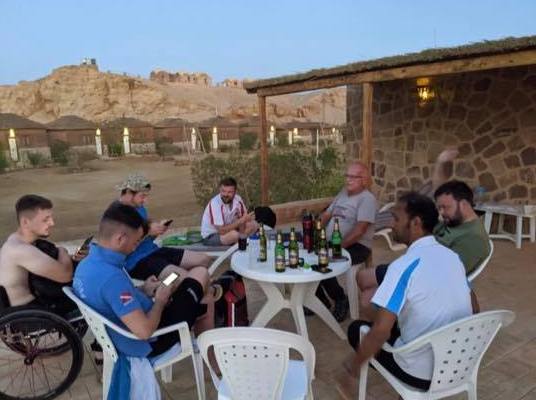
Last night and chill
What we do works:
In recent years there have been three academic studies into our work:
2018 – A study by a team from the University of Sheffield Medical School.
2019 – A study by The Centre of Trauma at Nottingham University.
Both these studies reported very positively on Deptherapy’s work both underwater but also in terms of the provision of 24/7 support.
The following is from our press release which was issued on 26th October:
‘A new study into Scuba Diving Rehabilitation Charity Deptherapy’s approach to supporting Armed Forces veterans with psychological injuries such as Post-traumatic Stress Disorder (PTSD) through the medium of scuba diving has been carried out by Petra Walker in conjunction with Hanna Kampman of the Posttraumatic Growth Research Unit at the University of East London.
This study, which used Interpretive Phenomenological Analysis (IPA), demonstrates that scuba diving has rehabilitation benefits beyond those found in other forms of sporting rehabilitation exercise. IPA is a qualitative methodology that examines the experiences of participants and has been used in previous studies of Posttraumatic Growth (PTG) in para-athletes.
Petra is an experienced diver herself and was exploring the wellbeing aspects of scuba diving as part of her Masters in Applied Positive Psychology and Coaching Psychology when she came across a previous study on Deptherapy. Past studies have mainly focused on the medical aspects of diving, so the opportunity to examine the mental health side of rehabilitative scuba diving was impossible to ignore. The full study is currently embargoed until it is published at a future date in an academic journal, but it follows similar academic research into the work of Deptherapy by the University of Sheffield Medical School (2018) and the University of Nottingham (2019).’
This is amazing news and sets us apart from other sporting rehabilitation programmes.
We are currently working with our VP Richard Castle who is a Consultant Psychologist and our Dive Medicine Advisor Mark Downs to identify further areas of psychological and physical dive related research.
We end the week on a happy note. A young man who has learned to dive properly with a RAID OW 20 certification, a new RAID Master Rescue Diver, two new RAID Sidemount Divers, 5 new RAID O2 Providers, many assessments for our DMs but most of all a week of learning, of making new friendships, renewing old friendships, and building on our family ethos.
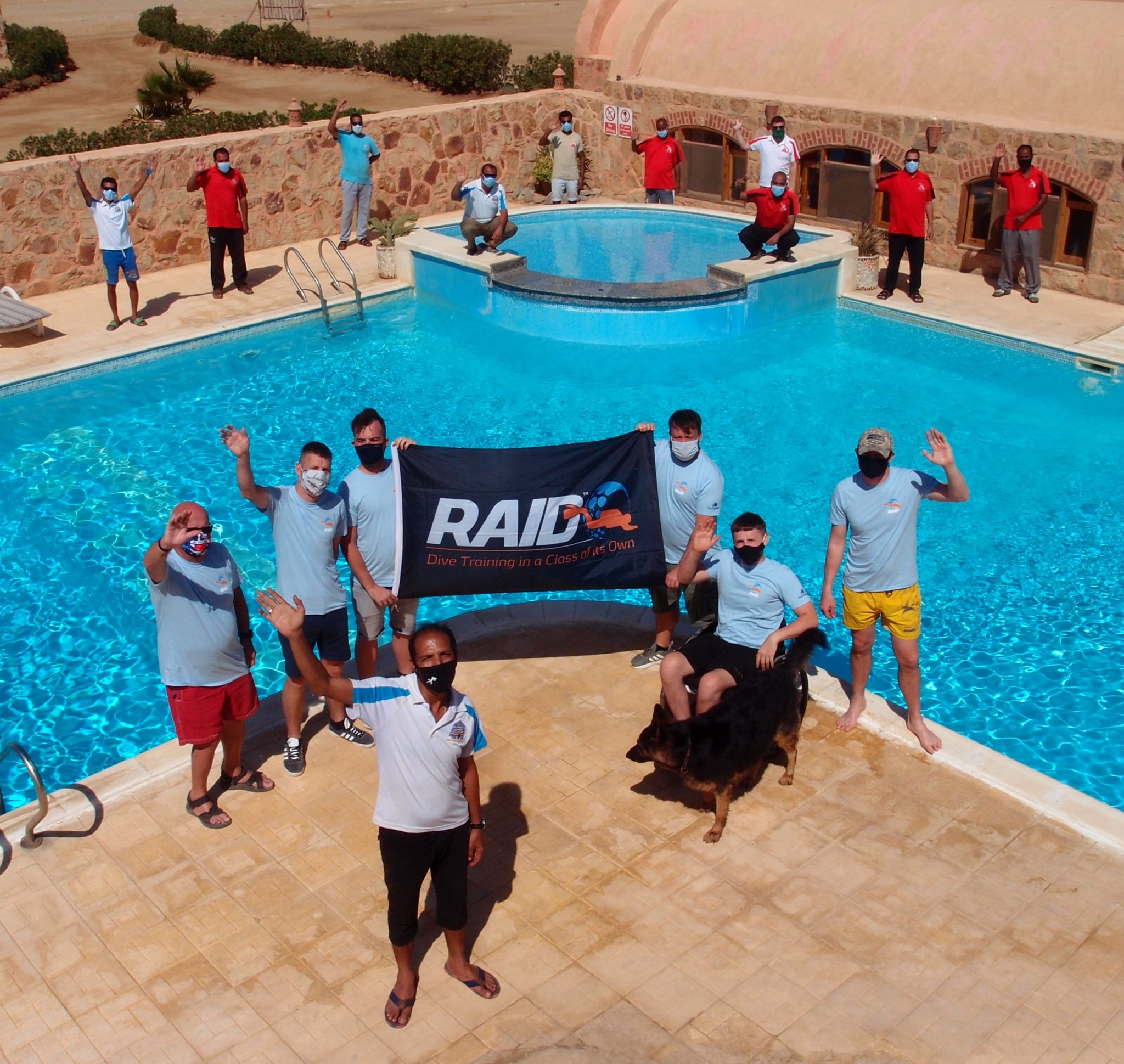
Until we meet again…
![]() For us, Deptherapy is a journey, a journey that continues to push boundaries in the use of scuba diving in the rehabilitation of those suffering life changing mental and/or physical challenges. On our journey we want to change the way the scuba diving industry views diving for those with disabilities.
For us, Deptherapy is a journey, a journey that continues to push boundaries in the use of scuba diving in the rehabilitation of those suffering life changing mental and/or physical challenges. On our journey we want to change the way the scuba diving industry views diving for those with disabilities.
 In the new year, we will be launching, with our diver training agency partners RAID, a new and exciting adaptive teaching programme that will offer diving to the disabled community. We can’t wait to share it with you!
In the new year, we will be launching, with our diver training agency partners RAID, a new and exciting adaptive teaching programme that will offer diving to the disabled community. We can’t wait to share it with you!
Find out more about the work of Deptherapy and Deptherapy Education at www.deptherapy.co.uk
Blogs
Intro to Tech: What is it about?
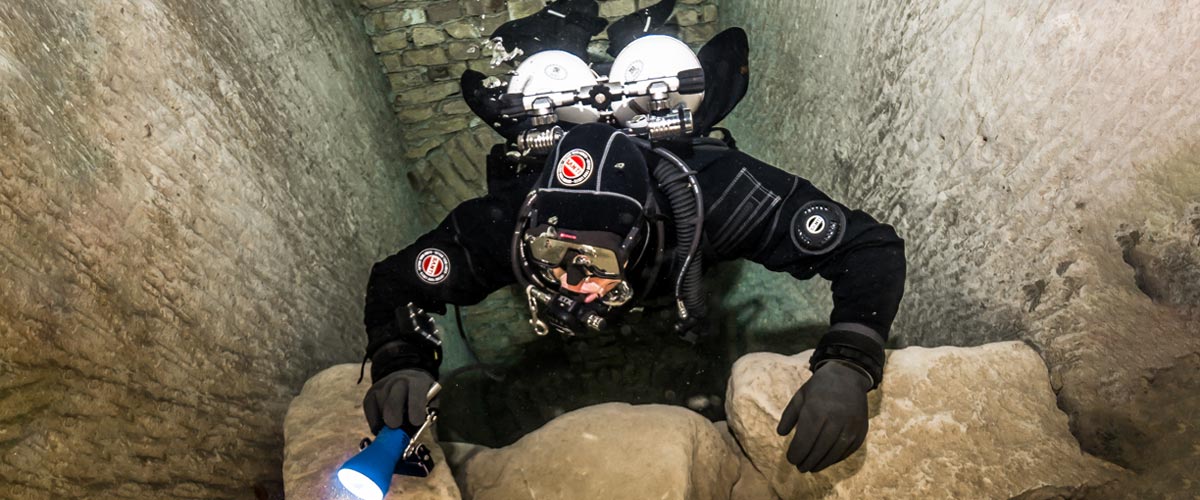
Article by José Pablo Mir
Pictures by Cezary Abramowski
The world of technical diving is exciting. It opens the door to new sites, depths, and bottom times. More importantly, it opens our minds to a new way of planning, facing, and experiencing dives, even those not purely technical.
Becoming a technical diver is a process, and like in other aspects of life, we should find the proper entry point that suits us best based on our knowledge and experience. The Introduction to Technical Diving course from TDI -the world’s largest and most recognized technical diving teaching organization- is the best option for divers who have yet to gain experience in the fundamental aspects of this new practice. The course’s content and its embrace of new techniques and technologies make it possible to acquire a solid foundation to learn and gain experience in this practice properly.
Becoming a technical diver is not something that happens overnight, whether deciding to become one or receiving a certification card stating we are now technical divers. It is a slow process extending farther away than any introductory course. It requires effort and dedication. But it will bring us satisfaction from day one -or two.
It is a matter of mentality
First, we must understand and accept that technical diving, involving greater depths, longer bottom times, exotic gases, virtual or real ceilings, and more, comes with higher levels of risk than the sport diving we have been practicing until now.
Although this discussion usually starts with a warning about risks, as I’ve done in the previous sentence, our practice is not a game of chance.
Technical diving is a rational activity that requires maturity and good judgment, and we will put everything into ensuring that each dive is a successful one -meaning we return from it safe and sound. With this understanding, we will strive to establish a mental attitude more aligned with our practice and its realities.
This new “technical diver” mindset we will develop will lead us to be more cautious in our executions, more analytical in our plans, more rational in our strategies, and more detailed in our procedures.
Experience will keep teaching us to know ourselves better, to keep our anxiety and other emotions under control, and to manage our impulses. Over time, our senses will sharpen, and we will be more attentive to the particulars of the situation we find ourselves in.
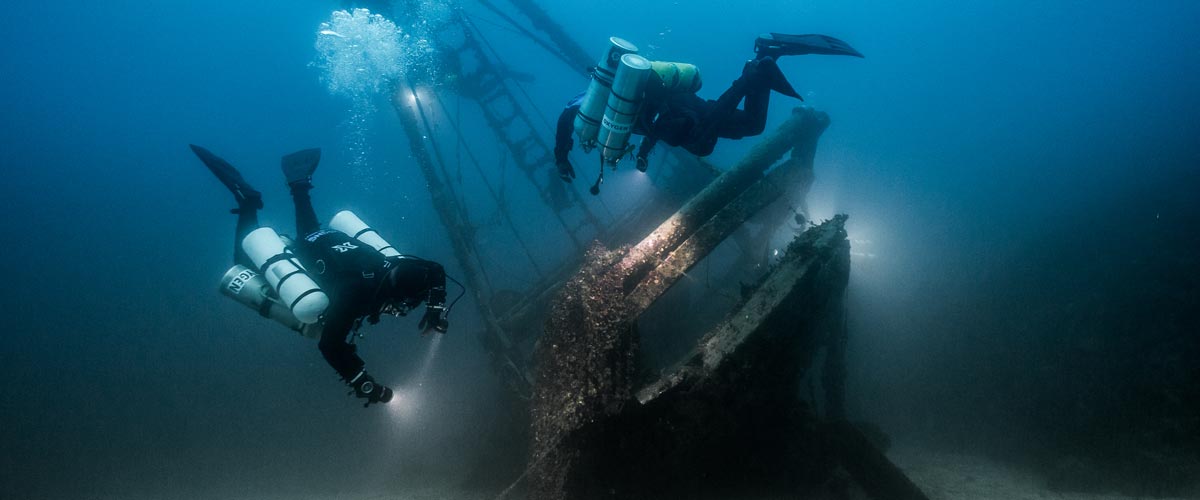
Strategies and procedures
Our strategies, those broad guiding lines tracing the path to follow, from how to approach planning to where, with what, and how we are willing to get there, will be more specific and more practical. Not because they magically become so, but because we will consciously and deliberately frame them that way.
We will establish clear, concise, and realistic procedures. Not only for the undesirable situations that may present themselves but also for those that are part of our dive objectives.
Even though, as technical divers, we often use equipment different from what we were previously accustomed to, it is essential to note that the gear does not make the diver. In a way, we could consider such equipment as the necessary tools to implement what our goal seeks to achieve, according to our strategies and procedures.
Technique plays an important role
We must put our greatest effort into learning and perfecting the different techniques we will be acquiring. Buoyancy, trim, propulsion, cylinder handling, deploying DSMBs and lift bags, valve drills, and more are essential skills we must begin to master to progress in our art. What we cannot do, when we need to do it, can harm us.
Our techniques must be effective and achieve the purpose for which they were devised. But they must also be efficient and require the least resources possible, including the time they take and the effort they demand. Effectiveness and efficiency will prevail over beauty and other considerations that may come to mind, although none of them should be mutually exclusive. A technique executed efficiently and effectively tends to have an inherent beauty.
Refining techniques is a lifelong mission. Some of them will be easy to master from the go; others, on the other hand, will be our life mission and will require many repetitions just to resemble the idea we have in mind of how they should be executed.
We must consider the environment
Our learning, the needs and musts of the practice we engage in, the experience we gradually gain, our strategies and procedures, and even our equipment and tools change with the environment.
Diving in the ocean, everything about us must be suitable for ocean dives. Conditions there rarely emulate those found in a pool, lake, or river. Variable winds and currents, greater depths, visibility conditions, other divers with uncertain skills around us, marine life, maritime traffic, distance from the coast, and many other factors add complexity and uncertainty.
It is never necessary to master the pool on the first day, but planning and aspiring to gradually cope with the ocean’s conditions is essential.
The cost of good training
We are aware that our resources are often scarce in relation to the possibilities of use we could give them if they were not. To a greater or lesser extent, we are part of the economic reality in which we are embedded.
Fortunately, the cost of good technical diver training is not an entry barrier. Comparing training and equipment costs, we see that the former are generally lower. Yes, lower cost for personalized service, essential to our future
performance and safety, than for a series of mass-produced products that are mere, albeit necessary, tools for an end.
The value of good training
The value of the training we received encompasses a range of characteristics, from emotional and methodological to technical and technological. TDI and its Introduction to Technical Diving course offer a deep and modern approach, with a teaching strategy that aims to create thinking divers, not merely obedient ones.
As technical divers, our knowledge is our primary tool. In this type of activity, what we don’t know can harm us.
Is this course optional?
Unfortunately, the fact that this Introduction to Technical Diving course is not a prerequisite for any subsequent training is an invitation to consider it optional. And we all know what usually happens to “optional” under budget constraints.
However, this course should be seen as optional only by those divers who are somehow familiar with the use of technical equipment, who have a mindset more in line with the requirements of this type of diving, who plan and execute the dives the proper “technical” way, who know their gas consumption rate, who are not intimidated by non-decompression tables, who feel comfortable using their dive computers, and know the techniques and have at least an acceptable level of buoyancy, positioning, and propulsion. Those can go straight to a more advanced training course, such as TDI’s Advanced Nitrox.
We must ask ourselves whether or not we are in that group.
Remember our goal: to have fun
Recreational diving is our passion. Jumping into the water carrying heavy equipment and having properly dotted our I’s and crossed our T’s have only one ultimate goal: fun. This is the activity we have chosen as a hobby. We must enjoy it; it must give us pleasure and make us vibrate.
Having a good time is not optional!
Blogs
Four opportunities to go pro in 2024 with Dive Friends Bonaire
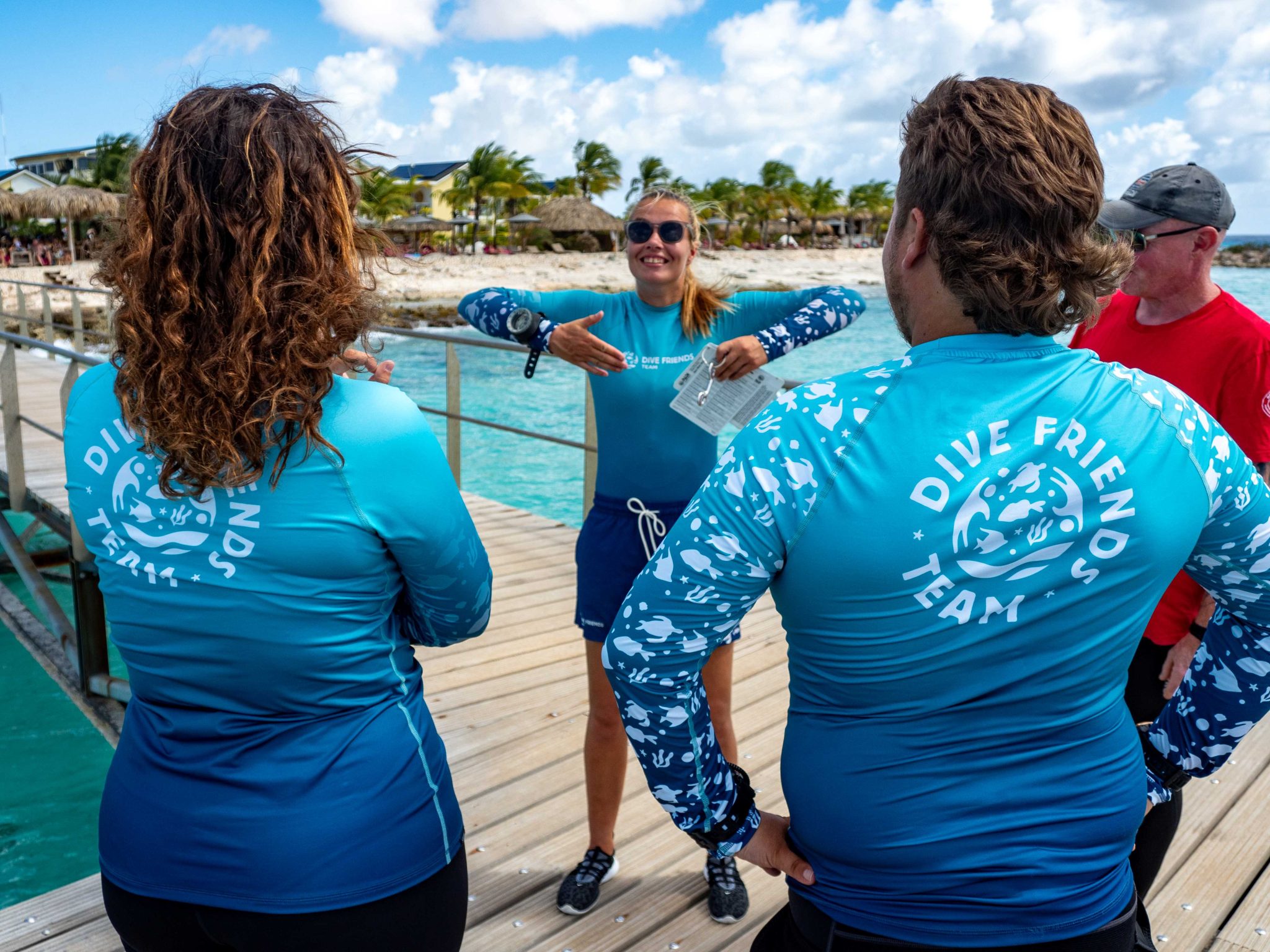
Dive Friends teaches the Instructor Development Course (IDC) several times a year to students who are eager to share their passion for diving with the world.
Dive Friends is known for the personal approach throughout the course. Their in-house course director will lead the students through every essential step, mentoring them to achieve their fullest potential as a dive instructor.
Applications for the following IDC start dates are now open:
- 12 April
- 5 July,
- 20 September
- 29 November
Partnership with Casita Palma
If the student opts for the IDC-Deluxe or IDC-Supreme package, their accommodation will be arranged for them at Casita Palma. This small and quiet resort is within walking distance from Dive Friends Bonaire’s main dive shop location and has everything you need to relax after an intense day of IDC training. Breakfast is included, so the student will always be fuelled and ready for their day.
Contact Dive Friends Bonaire’s Course Director Eddy for more information: coursedirector@divefriendsbonaire.com.
-

 News3 months ago
News3 months agoHone your underwater photography skills with Alphamarine Photography at Red Sea Diving Safari in March
-

 News3 months ago
News3 months agoCapturing Critters in Lembeh Underwater Photography Workshop 2024: Event Roundup
-

 Marine Life & Conservation Blogs2 months ago
Marine Life & Conservation Blogs2 months agoCreature Feature: Swell Sharks
-

 Blogs2 months ago
Blogs2 months agoMurex Resorts: Passport to Paradise!
-

 Blogs2 months ago
Blogs2 months agoDiver Discovering Whale Skeletons Beneath Ice Judged World’s Best Underwater Photograph
-

 Marine Life & Conservation2 months ago
Marine Life & Conservation2 months agoSave the Manatee Club launches brand new webcams at Silver Springs State Park, Florida
-

 Gear Reviews3 months ago
Gear Reviews3 months agoGear Review: Oceanic+ Dive Housing for iPhone
-

 Gear Reviews2 weeks ago
Gear Reviews2 weeks agoGEAR REVIEW – Revolutionising Diving Comfort: The Sharkskin T2 Chillproof Suit















